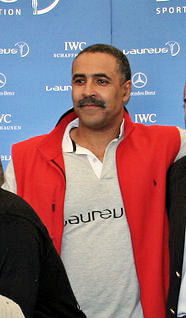A Quote by Chuck Klosterman
What's hard to do is describe why you like something. Because ultimately, the reason things move people is very amorphous. You can be cerebral about things you hate, but most of the things you like tend to be very emotive.
Related Quotes
What's hard to do is describe why you like something. Because ultimately, the reason things move people is very amorphous. You can be cerebral about things you hate, but most of the things you like tend to be very emotive. It's really hard to do a literary reproduction of what makes you happy. That's what I try to do. If nothing else, it seems like there's enough people out there telling the world what isn't cool, or what's terrible, or what's depressing. I think there's an element of cynicism in my writing, but I'm an optimistic cynic.
It's far easier to write why something is terrible than why it's good. If you're reviewing a film and you decide "This is a movie I don't like," basically you can take every element of the film and find the obvious flaw, or argue that it seems ridiculous, or like a parody of itself, or that it's not as good as something similar that was done in a previous film. What's hard to do is describe why you like something. Because ultimately, the reason things move people is very amorphous. You can be cerebral about things you hate, but most of the things you like tend to be very emotive.
I hate slick and pretty things. I prefer mistakes and accidents. Which is why I like things like cuts and bruises - they're like little flowers. I've always said that if you have a name for something, like 'cut' or 'bruise,' people will automatically be disturbed by it. But when you see the same thing in nature, and you don't know what it is, it can be very beautiful.
The thing that has always baffled me about people's perception of my writing is the sense that I'm a very controversial, opinionated, polarizing person. I feel like I write about things that I'm interested in, and I describe why they're interesting to me. I could be negative, I guess. It's far easier to write why something is terrible than why it's good.
I don't think all comedy should be mindless. Have something that's thoughtful. Maybe some things are tongue-in-cheek; maybe some things are very direct. I like that people have to think about things. That excites me. Because if you say certain things, it starts a dialogue. Even if you disagree, it's still a dialogue.
In America, even the critics - which is a pity - tend to genre-ize things. They have a hard time when genres get mixed. They want to categorize things. That's why I love Wes Anderson's films and the Coen Brothers, because you don't know what you're going to get, and very often you get something that you don't expect and that's just what a genre's not supposed to do.
Naturally looking at something will become so important in your aesthetic. For that, you have to be disciplined, too, in the way that there is a moment to catch and there is a moment to express. The moment to express has to be so pragmatic, because you have to build the clothes; you have to be very, very specific about how you want to describe to other people, for the color of the fabric, the way of sewing things, putting things together.
You can teach people specific reasoning, such as how to fly a kite or build a wheel. General reasoning cannot be imparted upon people, particularly if they like things the way they are - meaning, if their reactions are very simple. The reason most people behave badly or poorly is because they only understand simple things.
It's very hard, I think, for critics to write positive reviews, because there's not that much to say about something you like. You can kind of say 'I really like that band' and then if you're forced to fill up the rest of an article, you've got to start saying heady things. It's much easier to say negative things in a review.

































